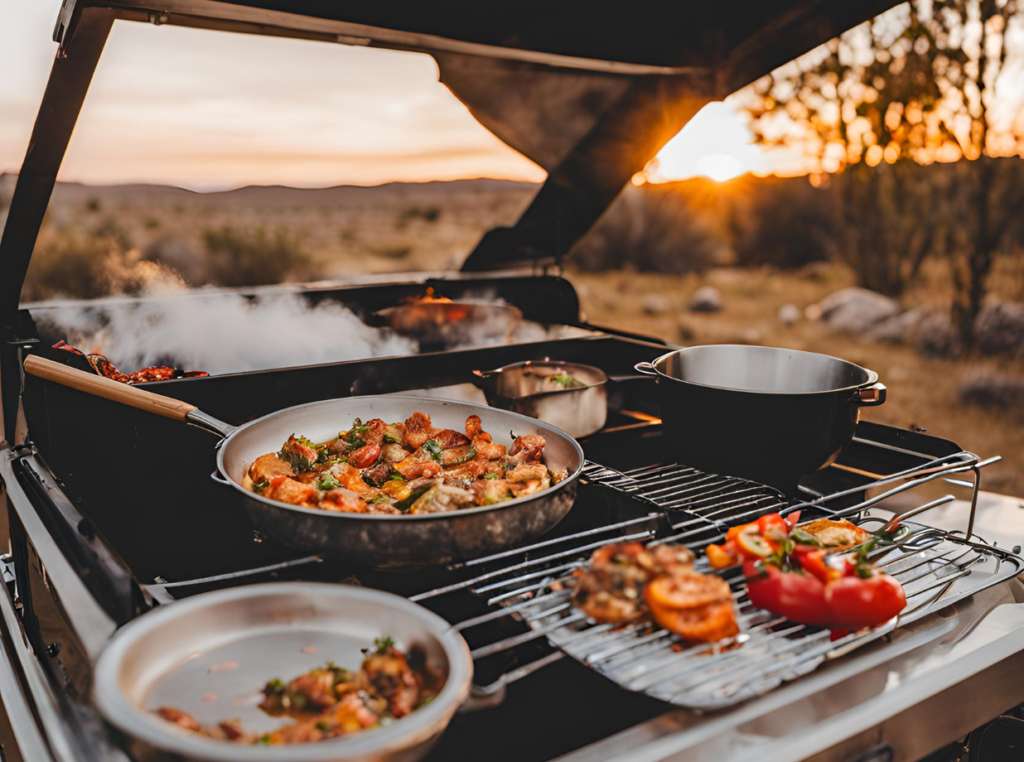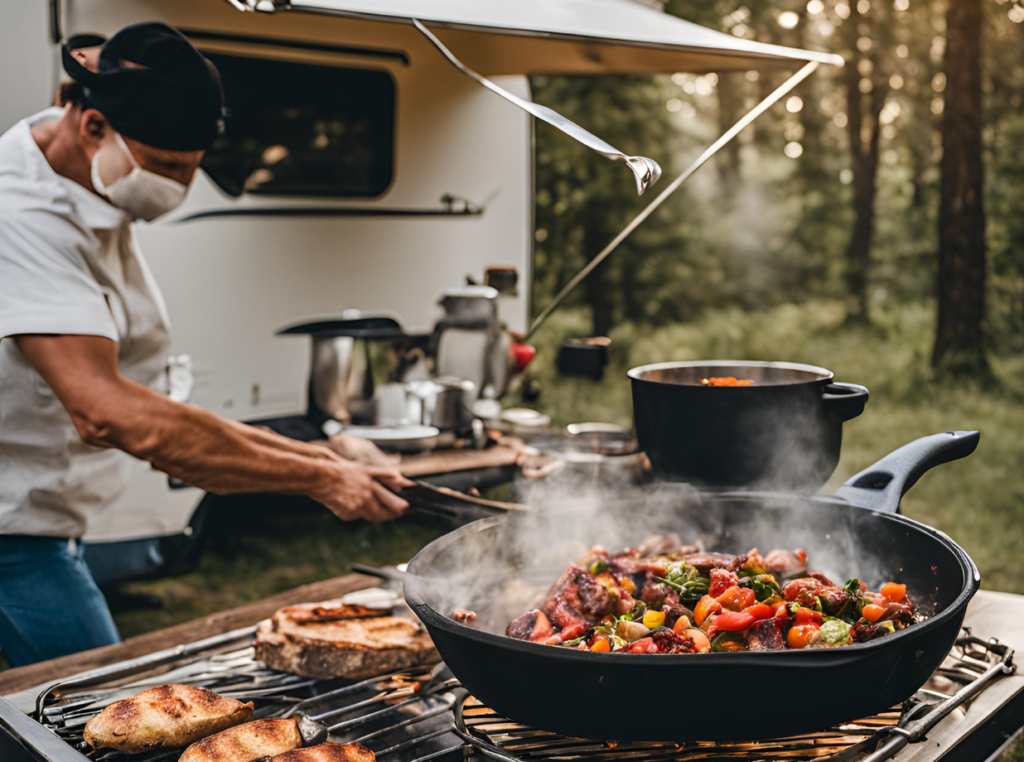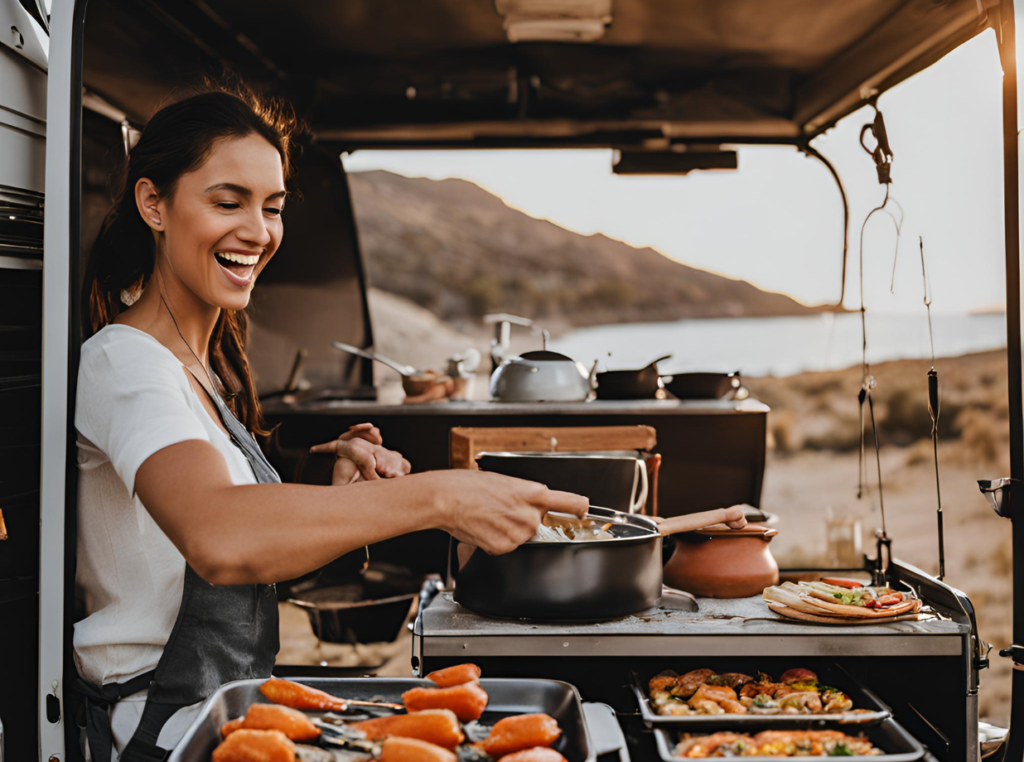Have you ever stood in the cramped kitchen of your RV, spatula in hand, and asked yourself, “Is propane or electric the best way to cook my world-famous campfire chili?” If you’ve been tormented by this existential dilemma, you’re not alone. RV enthusiasts around the globe debate this more intensely than they argue about the best campsite snack (hint: it’s s’mores).
What’s Cooking, Good Looking?
Let’s be real. RV cooking can either be a joy or a simmering pot of disaster. But before we get our knickers in a twist and unleash a culinary apocalypse, let’s understand the basics of our two contenders. Propane-powered and electric-powered cooking—both have their merits, both have their flaws, and both have left many an RV owner scratching their heads (and occasionally burning their fingers).
Propane: The Ancient Flame
Imagine you’re Indiana Jones, exploring the ruins of ancient RV cooking lore. Propane is that unequalled, timeless flame. It’s the original gangster of RV kitchens, more dependable than your old scoutmaster and with fewer questionable life choices.
The Good
- Portability: Propane is more portable than your Wi-Fi signal. You can use it with an indoor stove, an outdoor grill, or even a campfire (if you’re feeling particularly primal).
- Power: Unlike your dream of becoming a professional accordion player, propane packs a punch. You get great heat control and can cook up a storm—literally, considering how temperamental the weather can be.
- Independence: You’ll be Queen (or King) of the Road, unchained from the tyranny of electrical hookups. No need for an outlet to make that pot of coffee that’ll keep you alive through your early morning hike.
The Bad
- Storage: Propane tanks are bulky and about as fun to store as a herd of feral cats.
- Refilling: Refilling tanks can be inconvenient. It’s like a never-ending Easter egg hunt but without the chocolate or joy.
- Safety Concerns: Leaks can be dangerous. Unless you have a lifelong dream of being a human firework, be cautious.
Electric: The Shocking Choice
Now, if propane is the seasoned aunt who knows how to handle a spatula, then electric cooking is the millennial cousin who might just outshine everyone on TikTok. The modern, convenient, possibly overly-enthusiastic option.
The Good
- Convenience: Plug and play. Literally. Just plug in your appliances, and you’re good to go. It’s like magic but without the need to believe in unicorns.
- Safety: No open flames here! Your eyebrows will remain intact.
- Versatility: From microwaves to induction cooktops, the choices are abundant. If variety is the spice of life, welcome to your new spice rack.
The Bad
- Dependency: If electricity is down, so are you. You’d be better off trying to grill your chicken over a flashlight.
- Power Consumption: Electric appliances can drain your RV battery faster than your toddler drains your patience.
- Heat Control: Electric cooking can sometimes feel like trying to strangle a ghost—vague and ultimately unfulfilling.
The Great Propane vs Electric RV Cooking Showdown
Let’s get ready to rumble! Picture this: a boxing ring, referee, dramatic lighting phases, and somewhere Rocky’s theme is echoing. On one side, we have Propane—the classic heavyweight; on the other, Electric—the nimble newcomer. Let the showdown begin.
Round 1: Convenience & Setup
Propane
Setting up propane for cooking is like preparing for a minor battle. You need to attach the tank, check for leaks, and finally ignite. Smell something funky? Abort mission; it’s probably a leak.
Electric
Electric setups are as simple as your motivation the day before vacation—plug it in, and you’re ready. However, God forbid the power goes out. Then you’re basically cooking with Morse code.
Round 2: Cooking Performance
Propane
- Speed: Fast and furious, just like your dog’s sprint to chase the squirrel.
- Temperature Control: Think of it like a go-kart; quick and responsive. Your steak shall be seared to perfection.
Electric
- Speed: Moderately paced, comparable to a snail delivering mail on a unicycle.
- Temperature Control: It can be a bit hit-or-miss. More like an excited weatherman predicting sunshine and blizzards in the same forecast.
Round 3: Safety
Propane
Open flames can add a certain risk factor, kind of like playing Jenga with a stack of dynamite. Ensure you regularly check hoses and tanks and have a working carbon monoxide detector.
Electric
Safer than a padded room, mostly. Nevertheless, keep an eye out to avoid any electrical mishaps reminiscent of an overenthusiastic Christmas light display.

Cooking Gear: What’s the Deal?
This isn’t just about two fuel types; it’s about their entourage as well. Your gear can make or break your culinary aspirations. From grills to stovetops, microwaves, and coffee makers, each type has its own clan. Here’s how they stack up:
| Gear Type | Propane Gear | Electric Gear |
|---|---|---|
| Stovetops | Durable, reliable. Gets hot fast, pristine for soups and sauces. | Easy use, simple cleanup. Less heat control, sometimes as rebellious as a teenager. |
| Grills | Ideal for BBQ and achieving those Instagram-worthy grill marks. | Convenient, great for toasty options and veggies. Can lack that authentic smokiness. |
| Ovens | Perfect for baking. Think classic bread, muffins, and satisfying pastries. | Can be dual microwave/convection. Offers more cooking methods than your kitchen back home. |
| Small Appliances | Portable propane coffee makers are a dream come true, fluttering hearts across campsites. | Coffee makers, microwave ovens, blenders, and more. If you can plug it in, you’re all set. |
The Wallet War: Costs & Maintenance
If money talks, both propane and electric are fluent in sarcasm and innuendos. Budget constraints, maintenance costs, and unexpected expenses (like replacing that blender you thought could handle your avocado pits) tip the scales in this category.
Propane
Upfront Costs
Propane systems can be a bit dear initially. Thanks in part to the tank, and the regulators, and the never-ending list of must-haves, it’s like the gourmet meal kit subscription nobody thought you needed.
Maintenance
Once set up, maintenance is pretty straightforward—sanitize the lines, keep an eye on the tanks, and don’t let squirrels nibble on your hoses. Easy peasy.
Electric
Upfront Costs
Plugging into an existing electrical system keeps costs modest in the beginning. Modern appliances might sting a bit if you’re aiming for a zero-grill-marks-left-behind experience.
Maintenance
Not as complex as a NASA launch sequence. As long as you dodge the water sources and ensure everything remains untangled, you’re golden. Except when you trip over power cords; then you’re less golden, more bruised.

The Eco-Tango: Environmental Impact
Let’s chat about Mother Earth, shall we? Depending on your green philosophy (or your guilt complex about using plastic straws), your cooking choice can become an eco-debate hotter than your burner.
Propane
Propane burns cleaner than wood and coal but isn’t entirely guilt-free. It’s a fossil fuel, translating to its fair share of pollutants. However, many see it as the lesser evil—like choosing between Brussels sprouts and boiled spinach.
Electric
Electricity can be greener, particularly when sourced from renewables. Yet, if your RV is guzzling non-renewable juice, it can feel oxymoronic. Imagine bragging about running a marathon while secretly sprinting to the sidelines for a donut.
The Social Scrabble: Community Opinions
Let’s address the jumbo-elephant-in-the-tiny-RV. When it comes to consistent chatter, forums, Facebook groups, and cigar-filled campsites have endless tales of woe and wisdom. The ultimate social consensus often sways your final choice.
Propane Praise
- “Jesse from Idaho” couldn’t be more thrilled about propane’s power and outdoor capability.
- “Margaret from Florida” recalls fond memories of Thanksgiving pies baking to golden perfection.
Electric Exaltation
- “Tom from California” swapped his propane for electric and hasn’t looked back, savoring the ease and safety.
- “Lisa from New York” loves her electric appliances, or as she fondly calls them, “the dream team,” for their sheer modern convenience.
The Buying Guide: Picking Your Poison
So, you have marinated in facts, simmered in opinions, and boiled over costs. Now it’s time to make your call. Here’s a succinct buying guide to give you clarity amidst this culinary chaos.
Propane Enthusiasts
If you value portability, high heat, and the scent of adventure, propane may be your culinary sidekick. Stock up on reliable brands, invest in safety gear, and embrace the quirks of storage.
Electric Admirers
If plug-and-play convenience, safety, and modern appliances amp up your RV experience, electric is your friend. Ensure you have a robust electrical setup and indulge in the latest tech for a seamless experience.
Conclusion: The Final Verdict
So, what’s the ultimate chorus in The Great Propane vs Electric RV Cooking Showdown? Drumroll, please…
The truth is, your winning side depends on your cooking style, travel habits, and that nagging voice in your head. Choose propane for robust, high-heat experiences and pure wanderlust freedom. Opt for electric if safety, convenience, and a touch of modernity tickle your taste buds.
In the end, either way, you’ll feast like a king or queen, armed with newfound knowledge and perhaps an amusing tale of culinary conquests. So, pop that metaphorical champagne (or fizzy non-alcoholic equivalent of choice) and cook up a storm, wherever your RV chariot takes you.
Remember, the best way to settle this debate? A sumptuous taste test of propane-grilled steak in one hand and an electrically-crafted crème brûlée in the other. Only then can contentment reign supreme in your RV journey!


